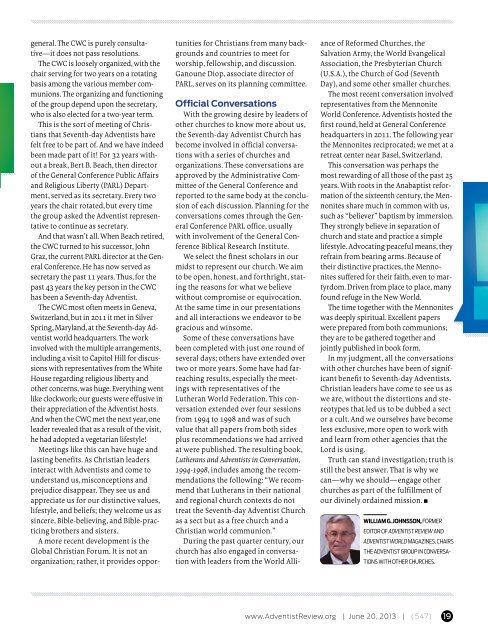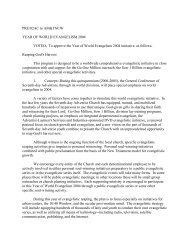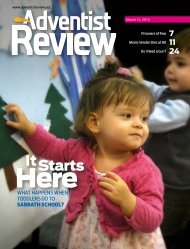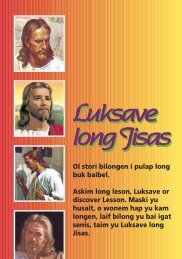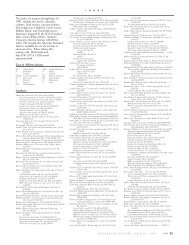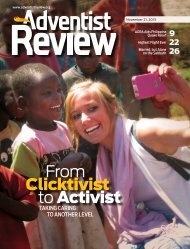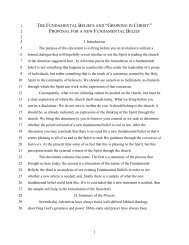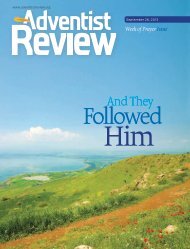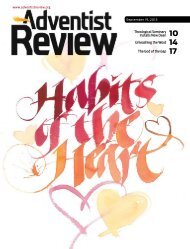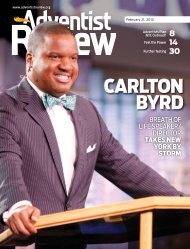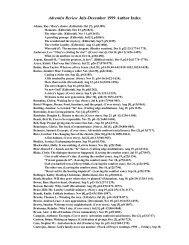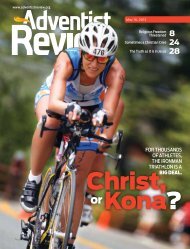Download PDF - Adventist Review
Download PDF - Adventist Review
Download PDF - Adventist Review
- No tags were found...
You also want an ePaper? Increase the reach of your titles
YUMPU automatically turns print PDFs into web optimized ePapers that Google loves.
general. The CWC is purely consultative—it<br />
does not pass resolutions.<br />
The CWC is loosely organized, with the<br />
chair serving for two years on a rotating<br />
basis among the various member communions.<br />
The organizing and functioning<br />
of the group depend upon the secretary,<br />
who is also elected for a two-year term.<br />
This is the sort of meeting of Christians<br />
that Seventh-day <strong>Adventist</strong>s have<br />
felt free to be part of. And we have indeed<br />
been made part of it! For 32 years without<br />
a break, Bert B. Beach, then director<br />
of the General Conference Public Affairs<br />
and Religious Liberty (PARL) Department,<br />
served as its secretary. Every two<br />
years the chair rotated, but every time<br />
the group asked the <strong>Adventist</strong> representative<br />
to continue as secretary.<br />
And that wasn’t all. When Beach retired,<br />
the CWC turned to his successor, John<br />
Graz, the current PARL director at the General<br />
Conference. He has now served as<br />
secretary the past 11 years. Thus, for the<br />
past 43 years the key person in the CWC<br />
has been a Seventh-day <strong>Adventist</strong>.<br />
The CWC most often meets in Geneva,<br />
Switzerland, but in 2011 it met in Silver<br />
Spring, Maryland, at the Seventh-day <strong>Adventist</strong><br />
world headquarters. The work<br />
involved with the multiple arrangements,<br />
including a visit to Capitol Hill for discussions<br />
with representatives from the White<br />
House regarding religious liberty and<br />
other concerns, was huge. Everything went<br />
like clockwork; our guests were effusive in<br />
their appreciation of the <strong>Adventist</strong> hosts.<br />
And when the CWC met the next year, one<br />
leader revealed that as a result of the visit,<br />
he had adopted a vegetarian lifestyle!<br />
Meetings like this can have huge and<br />
lasting benefits. As Christian leaders<br />
interact with <strong>Adventist</strong>s and come to<br />
understand us, misconceptions and<br />
prejudice disappear. They see us and<br />
appreciate us for our distinctive values,<br />
lifestyle, and beliefs; they welcome us as<br />
sincere, Bible-believing, and Bible-practicing<br />
brothers and sisters.<br />
A more recent development is the<br />
Global Christian Forum. It is not an<br />
organization; rather, it provides oppor-<br />
tunities for Christians from many backgrounds<br />
and countries to meet for<br />
worship, fellowship, and discussion.<br />
Ganoune Diop, associate director of<br />
PARL, serves on its planning committee.<br />
Official Conversations<br />
With the growing desire by leaders of<br />
other churches to know more about us,<br />
the Seventh-day <strong>Adventist</strong> Church has<br />
become involved in official conversations<br />
with a series of churches and<br />
organizations. These conversations are<br />
approved by the Administrative Committee<br />
of the General Conference and<br />
reported to the same body at the conclusion<br />
of each discussion. Planning for the<br />
conversations comes through the General<br />
Conference PARL office, usually<br />
with involvement of the General Conference<br />
Biblical Research Institute.<br />
We select the finest scholars in our<br />
midst to represent our church. We aim<br />
to be open, honest, and forthright, stating<br />
the reasons for what we believe<br />
without compromise or equivocation.<br />
At the same time in our presentations<br />
and all interactions we endeavor to be<br />
gracious and winsome.<br />
Some of these conversations have<br />
been completed with just one round of<br />
several days; others have extended over<br />
two or more years. Some have had farreaching<br />
results, especially the meetings<br />
with representatives of the<br />
Lutheran World Federation. This conversation<br />
extended over four sessions<br />
from 1994 to 1998 and was of such<br />
value that all papers from both sides<br />
plus recommendations we had arrived<br />
at were published. The resulting book,<br />
Lutherans and <strong>Adventist</strong>s in Conversation,<br />
1994-1998, includes among the recommendations<br />
the following: “We recommend<br />
that Lutherans in their national<br />
and regional church contexts do not<br />
treat the Seventh-day <strong>Adventist</strong> Church<br />
as a sect but as a free church and a<br />
Christian world communion.”<br />
During the past quarter century, our<br />
church has also engaged in conversation<br />
with leaders from the World Alliance<br />
of Reformed Churches, the<br />
Salvation Army, the World Evangelical<br />
Association, the Presbyterian Church<br />
(U.S.A.), the Church of God (Seventh<br />
Day), and some other smaller churches.<br />
The most recent conversation involved<br />
representatives from the Mennonite<br />
World Conference. <strong>Adventist</strong>s hosted the<br />
first round, held at General Conference<br />
headquarters in 2011. The following year<br />
the Mennonites reciprocated; we met at a<br />
retreat center near Basel, Switzerland.<br />
This conversation was perhaps the<br />
most rewarding of all those of the past 25<br />
years. With roots in the Anabaptist reformation<br />
of the sixteenth century, the Mennonites<br />
share much in common with us,<br />
such as “believer” baptism by immersion.<br />
They strongly believe in separation of<br />
church and state and practice a simple<br />
lifestyle. Advocating peaceful means, they<br />
refrain from bearing arms. Because of<br />
their distinctive practices, the Mennonites<br />
suffered for their faith, even to martyrdom.<br />
Driven from place to place, many<br />
found refuge in the New World.<br />
The time together with the Mennonites<br />
was deeply spiritual. Excellent papers<br />
were prepared from both communions;<br />
they are to be gathered together and<br />
jointly published in book form.<br />
In my judgment, all the conversations<br />
with other churches have been of significant<br />
benefit to Seventh-day <strong>Adventist</strong>s.<br />
Christian leaders have come to see us as<br />
we are, without the distortions and stereotypes<br />
that led us to be dubbed a sect<br />
or a cult. And we ourselves have become<br />
less exclusive, more open to work with<br />
and learn from other agencies that the<br />
Lord is using.<br />
Truth can stand investigation; truth is<br />
still the best answer. That is why we<br />
can—why we should—engage other<br />
churches as part of the fulfillment of<br />
our divinely ordained mission. n<br />
WILLIAM G. JOHNSSON, FORMER<br />
EDITOR OF ADVENTIST REVIEW AND<br />
ADVENTIST WORLD MAGAZINES, CHAIRS<br />
THE ADVENTIST GROUP IN CONVERSA-<br />
TIONS WITH OTHER CHURCHES.<br />
!<br />
www.<strong>Adventist</strong><strong>Review</strong>.org | June 20, 2013 | (547) 19


